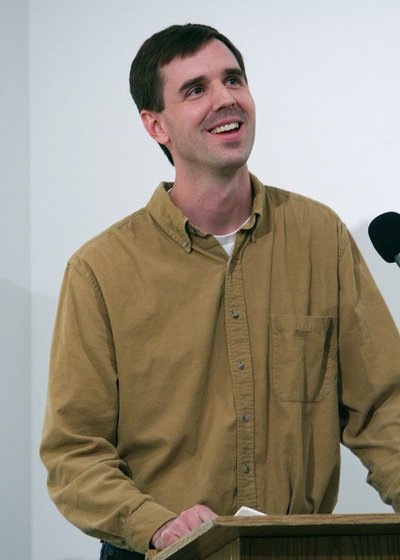February 15, 2007
‘Getting it exactly right’: Eric McHenry, associate editor of ‘Columns,’ wins poetry award
Eric McHenry, associate editor of the UW’s Columns magazine, is the winner of the Kate Tufts Discovery Award for his first book of poetry, Potscrubber Lullabies. The $10,000 award is given by the Claremont Graduate University.
McHenry, who holds a master’s in creative writing from Boston University, has been writing poetry since high school, but more seriously since his undergraduate years at Beloit College in Wisconsin, where one of his mentors was Carolyn Kizer, who did graduate study at the UW and founded Poetry Northwest.
McHenry writes what he calls “formal” poetry. “The poems that I write rhyme and scan,” he says. “That’s not because I think poets should write that way. It’s just that the poets who have written the poems I would most like to have written — Robert Frost and Elizabeth Bishop and Philip Larkin — have written that way.”
When asked how he writes his poems, McHenry is self deprecating. “Very slowly,” is his answer, though he goes on to explain that he often starts with a single line or idea, and then works for months, revising and revising. He once started with a line that he knew somehow would be in the middle of the poem, then built the rest of the poem around it.
There are 41 poems in his first collection, published by Waywiser Press in 2006.
“Potscrubber Lullabies is a most exceptional first book,” says Robert Wrigley, chair of the Tufts Award Judging Committee. “It demonstrates this young poet’s extraordinary command of form: It rhymes relentlessly, slyly and above all, artfully.”
The book’s title comes from a poem McHenry wrote about the birth of his son four years ago. Potscrubber is the name of a model of General Electric dishwasher that was in the apartment he lived in at the time. He and his publisher briefly worried about General Electric suing them over the book’s title, McHenry says with a laugh, but upon seeking legal advice, they realized the company wouldn’t be bothered by it.
A native of Topeka, Kansas, McHenry says his poems are frequently set there, though they aren’t necessarily about the city. “They are and they aren’t,” he says. “I think more broadly they are about impermanence.”
Most of his relatives still live in Topeka, and although he’s the only published poet in the family, he says he thinks he came by his interest in poetry naturally. “There was poetry in the house when I was growing up. My mom liked to recite poetry and was from a family where a certain amount of Longfellow and Poe was on the tips of everyone’s tongues.”
In his college years, however, McHenry liked all forms of writing, and was frustrated in applying to graduate school to learn that he had to choose one genre to specialize in. That’s why he’s been quite content to pursue a career in journalism both before and after graduate school. Anyway, he says with a laugh, poetry doesn’t usually pay very well.
“I guess maybe the reason I write poetry is that it’s uniquely well suited to the idiosyncratic way my brain works — my desire to get something exactly right, both sonically and in terms of its meaning or implications,” he says. “W.H. Auden said that poetry is the best words in the best order, and, working in journalism, you don’t have time for that. You do the best you can under deadline pressure, and I’m constantly doing that in my professional life.
“So it’s nice to have this sort of counterpoint where I’m not going to get paid for it, there’s no deadline, the world is not out there clamoring for my next poem, so I can take as much time as I want. Once it’s finished, it’s nice to have this artifact, that feels more or less complete, more or less as you wanted it, something that gives you pleasure.”
McHenry says he hopes winning the award will help with the sale of his book, which is available at University Book Store, Open Books and through the publisher.
In addition to Wrigley, judges for the Tufts Poetry Award included Allison Joseph, an award-winning poet; Robert Pinsky, poet, critic and past Poet Laureate of the United States; Alice Quinn, poetry editor of the New Yorker; and Charles Harper Webb, poet and professor of English at California State University at Long Beach. The award will be presented on April 24 in Los Angeles.

